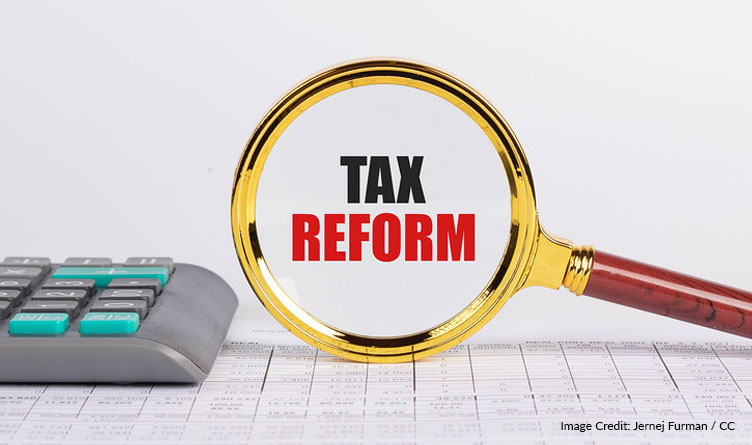Image Credit: Jernej Furman / CC
By Janelle Cammenga [Tax Foundation] –
Tennessee is a tax reform success story, but the hallmark of true progress is whether that success can be sustained.
With a focus on making the Volunteer State an attractive place to grow a business, Tennessee is in position to be one of the most enviable economies in the country.
Many states adopted tax reforms during the pandemic, and Tennessee is no exception. The state phased out one of the last vestiges of a personal income tax by finally eliminating the Hall Tax, now one of eight states without an individual income tax.
Even with this tax reduction, the Fiscal Review committee, which conducts analysis of tax and budget bills in Tennessee, estimates an almost 9% increase in tax revenue in fiscal year 2022 and predicts more growth in fiscal year 2023, although at a slower rate (4.6%). If lawmakers act wisely, they can use this recurring growth to set the state up for success long into the future.
Tennessee treats wage earners very favorably, but the tax code is less friendly to businesses. They can face up to three levels of taxation – something akin to a typical corporate income tax (the Excise Tax), a tax on businesses’ net worth (the Franchise Tax), and a gross receipts tax (the Business Tax). This level of complexity is uncommon among states.
In light of this threefold system, here are three reforms Tennessee should make to its tax code this year to stay competitive for workers and businesses.
First, the state should revamp the uncompetitive way its Excise Tax treats capital investment. Right now, Tennessee requires businesses to deduct expenses such as machinery and equipment over a number of years, rather than writing them off in the first year, as is possible for expenses such as labor and advertising.
Eighteen states allow the immediate “expensing” of all business investment, following the current federal treatment, which means Tennessee is falling behind, although federal expensing provisions will begin to roll back in 2023. Conforming to federal expensing provisions would bring Tennessee back in line with its peers, while making full expensing a permanent part of its corporate tax code would set the state apart in a good way.
Second, Tennessee should cap payments and reduce the rate of its Franchise Tax. Only 16 states levy franchise taxes, and Tennessee has one of the highest such rates nationwide. This tax serves as a sort of “wealth tax” on businesses, targeting the value of the company rather than its actual income. This creates ability-to-pay issues, especially for new or struggling businesses, or for all businesses in years when the economy is on a shaky foundation.
The reason? Even if a business doesn’t turn a profit in a given year, it’s still on the hook for its franchise tax payments. Lawmakers across the country have realized how damaging this can be, which is why four states have repealed their franchise taxes in recent years and two more are in the process of phasing theirs out.
*** Click Here to Support Conservative Journalism in Tennessee. We can’t bring you great Editorials like this without your support!***
While a full repeal of this tax may be difficult for Tennessee in the short term, creating a payment cap and lowering the franchise tax rate to lessen the state’s reliance on it would be a good first step.
Lastly, gross receipts taxes are harmful tax policy, even when levied at rates as low as Tennessee’s. The Business Tax targets a company’s gross sales, not taking into account expenses such as compensation or cost of goods sold. Like the franchise tax, gross receipts taxes hit new businesses especially hard, as they may not post profits right away.
Gross receipts taxes also “pyramid,” meaning they impose a tax upon a tax; the tax is levied at each stage of the production process. The local side of the Business Tax makes full repeal a difficult conversation, but continuing to lower rates on the state level would go a long way toward attracting new businesses and encouraging expanded investment.
Competition matters. Tennessee is encouraging new business by eliminating its one vestige of income taxation. The state should use its momentum from individual tax reform success to make its business taxes that much better, too.
About the Author: Janelle Cammenga is a policy analyst at the Tax Foundation, a nonpartisan think tank in Washington.





One Response
Some day our legislators and, hopefully, our citizens will awake to the fact that a tax on business is not a tax on business. Business taxes are simply factored into the price of products sold by that business, so the business tax is actually paid by the consumers of the products and services of that business. A business tax is a consumption tax, paid by consumers. Eliminating business taxes would result in reduced prices to consumers which would result in an increase in consumption which would mean an increase in government revenue from the sales tax. The net effect would be a significant increase in economic benefits to everyone. But, I’m not holding my breath. The power to tax is a lot easier than the hard work of demanding accountability.